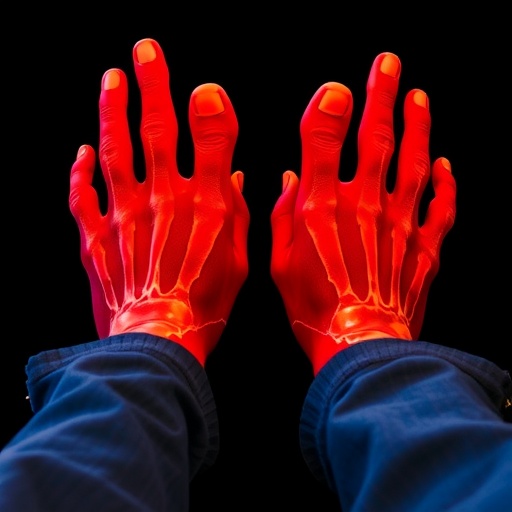Recent advancements in cancer treatment have brought to light various challenges related to the side effects of chemotherapeutic agents. Among these, capecitabine, a widely used oral chemotherapy drug, has been associated with a particularly distressing condition known as hand-foot syndrome. This painful and debilitating condition affects many patients undergoing treatment, necessitating a deeper understanding of its etiology, diagnosis, and management. Researchers, including those in a recent study by Chen, Wang, and Meng, have made strides in elucidating the complexities of capecitabine-induced hand-foot syndrome, shedding light on this pressing issue facing cancer patients.
Capecitabine acts as a prodrug that metabolizes into 5-fluorouracil (5-FU) within the body. While it is effective in treating various cancers, especially colorectal and breast cancer, its side effects can significantly impact patients’ quality of life. Hand-foot syndrome, characterized by redness, swelling, and peeling of the skin on the palms of the hands and the soles of the feet, can lead to severe pain, making it difficult for patients to perform daily tasks. The mechanism behind this syndrome involves vascular changes, increased sensitivity to friction and pressure, and possible changes in skin cell turnover, though it remains inadequately understood.
Diagnosis of hand-foot syndrome often relies on clinical evaluation, where physicians assess the characteristic symptoms and patient history. The American Society of Clinical Oncology provides guidelines that classify the syndrome into grades based on severity, which aids clinicians in determining the appropriate intervention. Early recognition is crucial because patients with more advanced stages of the syndrome may require dose adjustments or a shift in treatment protocols entirely, impacting their overall cancer management plan.
In their groundbreaking research, Chen, Wang, and Meng explored the mechanisms underlying capecitabine-induced hand-foot syndrome and identified potential biomarkers that could help in predicting which patients might be predisposed to this condition. Their findings suggest that genetic factors might play a significant role in the development of side effects from capecitabine, opening avenues for personalized medicine approaches. Understanding these susceptibility factors can lead to more tailored and effective treatment regimens, ultimately enhancing patient outcomes.
Management of hand-foot syndrome typically involves both preventive and therapeutic measures. For patients experiencing early symptoms, topical agents containing urea or aloe vera may provide relief by moisturization and promoting skin healing. In more severe cases, systemic treatments such as corticosteroids may be indicated. Chen and colleagues advocate for an integrated approach that combines pharmacological and non-pharmacological interventions. The potential use of dietary modifications and regular foot care routines has been discussed as ways to mitigate symptoms, although further empirical evidence is necessary to establish their efficacy.
The need for multidisciplinary collaboration in the management of cancer-related side effects is underscored by the findings of the recent study. Nurses, pharmacists, and dermatologists can play crucial roles in educating patients about potential side effects of chemotherapy, including hand-foot syndrome. By fostering open communication channels, healthcare professionals can ensure that patients report symptoms early, allowing for prompt interventions that can help manage discomfort and avert further complications.
Patients experiencing capecitabine-induced hand-foot syndrome may find solace in support groups and online forums. Engaging with peers who face similar challenges can provide emotional support and practical tips for managing symptoms. The psychosocial aspects of dealing with chronic side effects cannot be underestimated, and fostering a sense of community among patients can significantly alleviate feelings of isolation.
Furthermore, the study highlights the importance of ongoing research into the pathophysiology of chemotherapy-induced adverse events. Investigating the interplay between genetic predispositions and environmental factors may yield significant insights that could revolutionize patient care. The establishment of comprehensive databases capturing information on treatment responses, side effects, and patient demographics is vital to advancing the understanding of capecitabine and its side effects.
In conclusion, the advancements reported by Chen et al. are a call to action for the medical community to enhance the management of capecitabine-induced hand-foot syndrome. By embracing a holistic approach that integrates research findings with clinical practice, healthcare providers can better address the challenges posed by this condition. Ongoing education and collaboration among professionals will be paramount in improving diagnosis, treatment, and overall patient satisfaction in the face of cancer therapy.
As the landscape of cancer treatment continues to evolve, so too must our approaches to managing its side effects. The research into capecitabine-induced hand-foot syndrome serves as a poignant reminder of the interconnectedness of cancer treatment and patient well-being. Emphasizing the importance of research, education, and community support will pave the way for more compassionate and effective care for those navigating the complexities of cancer therapeutics.
In light of these advancements, the future looks promising for more thorough understanding and management of chemotherapy side effects. The commitment to understanding patients’ experiences and mitigating their discomfort marks a significant shift in cancer care paradigms. As new studies emerge and existing protocols are refined, the goal remains clear: to empower patients with the best possible care throughout their cancer journey.
Subject of Research: Capecitabine-induced hand-foot syndrome
Article Title: Advancements in the diagnosis and management of capecitabine-induced hand-foot syndrome
Article References:
Chen, B., Wang, X. & Meng, L. Advancements in the diagnosis and management of capecitabine-induced hand-foot syndrome.
J Cancer Res Clin Oncol 151, 265 (2025). https://doi.org/10.1007/s00432-025-06319-2
Image Credits: AI Generated
DOI:
Keywords: Capecitabine, hand-foot syndrome, cancer treatment, chemotherapy side effects, patient management, genetic predisposition, personalized medicine.




